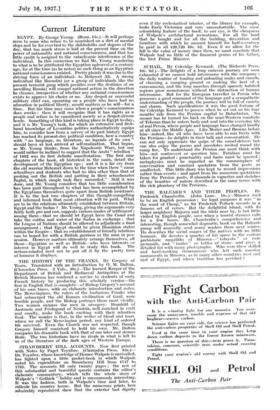SUHAIL. By Coleridge Kennard. (The Richards Press. 10s. 6d.)—The delights
of a long caravan journey are soon exhausted if we cannot hold intercourse with the company : the daily routine of loading and unloading mules and camels, of choosing a camping ground or making the best of a caravanserai, and the long marches through sparsely habited regions grow monotonous without the distraction of human intercourse. But for the European traveller in Persia who possesses a good command of the language and a sympathetic understanding of the people, the journey will be full of variety and charm. Such qualifications it was the good fortune of Sir Coleridge Kennard to possess when he set out on his four months' ride from the Persian capital to Baluchistan. No sooner has he turned his back on the semi-Western comforts of Teheran than he enters body and soul into the everyday life of real Persia, where people and language have changed hardly at all since the Middle Ages. Like Morier and Browne before him—indeed, like all who have been able to mix freely with the Persians—he delights in their talk and conversation. He can not only appreciate the quips of the camel-drivers but can also enjoy the poems and anecdotes recited round the camp fire. To understand the Persian one must think with him—not controvert or question him. Fatalism must be taken for granted : punctuality and haste must be ignored : metaphysics must be regarded as the commonplace of conversation and constant quotation from the poets as unaffected. This little diary was kept to record impressions rather than events : and apart from the numerous quotations from the Persian poets, it abounds in vignettes and sketches of the beauties of nature described in the same terms with the rich phantasy of the Persians.










































 Previous page
Previous page